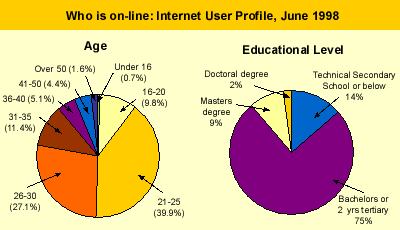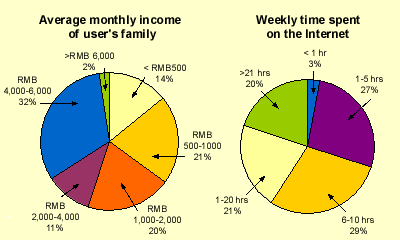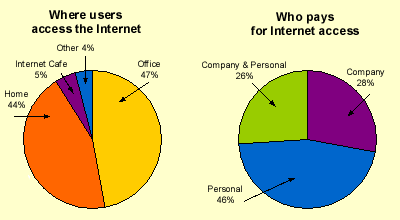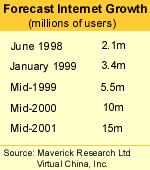 |
|
Analysis E-China I. China on-line: Real-time change or virtual reality? China's rolling out of the Internet looks paradoxical. It isn't. Admittedly it looks odd for the Communist Party to allow information to flow freely into and across a country where, until recently, total control was attempted over what people read, watched, or listened to. But that isn't why the Internet is taking off in China. The Internet is taking off in China because the infrastructure exists for it to do so -- and the country's leadership has excellent administrative and economic reasons for encouraging its citizens to go on-line. And this is why it's now so easy to get onto the Internet, why the number of Internet users will grow enormously in the next few years, and why concerns about information, although real, aren't so big they cannot be dealt with. Take Beijing. In 1999, all you need to be able to go on-line is a computer loaded with the appropriate software, say Netscape Navigator or Microsoft's Internet Explorer, and a modem plugged into a phone line. You don't need to register. You don't need to buy any proprietary software. You don't need to pay in advance. You just dial an access number at Beijing Telecom, the local arm of China's public telephone operator, and off you go (see box, "Going on-line in Beijing: Two Easy Options"). Sure, some sites are blocked and access can be a little slow. But basically everything is there: news, stock prices, shopping, entertainment, gambling, pornography and, yes, dissidence.
The service is possible because it is run by Beijing Telecom, the only fixed-line telecommunication operator in the city. For it, the Internet is a value-added service, allowing it to earn more revenue from subscribers to its phone lines. It charges for Internet access by simply adding another item to a subscriber's monthly bill hours of Internet usage -- and charging for it. This gives it every incentive to boost the numbers of people going on-line, and is part of the reason for the dramatic increase in the numbers already starting to access the Internet. However, to focus on the Internet is to miss the point. The Internet is neither the starting point nor the finishing point. It is simply the means to an ends. Indeed, to a variety of ends. It is, as we will repeat, simply infrastructure. True, much media coverage focuses on the Internet as starting point of China's embrace of the on-line world. But this is where much outside analysis of the potential impact of the Internet in China goes wrong, for it focuses neither on what the Internet is doing, nor where the Internet is going. With Internet stocks reaching dizzy heights in the United States, it is perhaps not surprising that the Western media have picked up on China's potential Internet stars. Top of the list are Charles Zhang and Edward Zeng, who head up respectively Sohu, a Chinese-language search engine and Internet portal modelled on the USA's Yahoo!, and Unicom Sparkice, a Sino-Canadian venture with various Internet interests, the most visible of which is a small chain of Internet cafés. Sohu's investors include Intel and Nicholas Negroponte, while visitors to the Internet Café in Beijing's China World complex have included Bill Clinton. But it is in fact the other way round. The Internet is built on the back of China's national information infrastructure -- a series of information networks rolled out over the last decade. Why have these networks been rolled out by the government? Why did the government create the environment for what now has become the "pandora's box" that is the Internet? Because that is what governments do -- that is, build infrastructure. And it should never be forgotten that China is still a socialist government, with a commitment to building infrastructure, and attempting to connect with all of its citizens, benignly or otherwise. So why is this bit of infrastructure getting special priority? After all, roads, water, energy and sewers are all equally pressing requirements. Perhaps more so. One reason is demand. Having built it, people are using it, which creates a virtuous circle -- revenues are generated, which both encourages and allows more infrastructure to be built. As has been shown with mobile phones in particular, but also with fixed lines, China's telecom authorities are very happy to reinvest in their networks if they expect revenue to flow in immediately. Another -- and the most important in explaining why so much effort has been invested so far -- is that the government is driving its development, for its administrative purposes.   
One of the most useful sources of basic data on the Internet in China are the surveys conducted every six months by ChinaNIC. The latest, carried out in June 1999, received more than 52,000 valid answers. It found that China's Internet users are predominantly young, well-educated and well-off. They spend a lot of time on -- 40% are on the Net for more than 10 hours a month -- and nearly half surf from their homes.
Over the last two decades, China has shown a huge love for everything electronic. By 1997, it had more than one colour television for every urban household. Cable TV has rolled out at a phenomenal rate, to reach more than 56 million households now. In telecoms, although the overall penetration rate remains low, the annual roll-out of fixed lines and mobile phones is extraordinary. Over the last few years, about 10 million new local subscribers have been added every year, while in 1998, some 11 million people became mobile phone users. The same is true for computers. With sales of PCs forecast at seven million to ten million over the next two years, China will be the world's third biggest computer market.
By all estimates, the same will be true for the Internet. From a handful of users in mid-1995, China officially had more than 4.0 million people on-line by July 1999. Unofficial estimates were much higher, and the total is set to grow exponentially over the next few years. But how does this make sense? Aren't China's rulers obsessed with controlling information? Can they be expected to make an exception for the Internet? Will the Internet in China develop with the same unfettered characteristics experienced in North America and Europe, or will it be forced into developing Chinese socialist characteristics? This special subject looks at these questions by suggesting that China's acceptance -- and the Chinese leadership's acceptance -- of the Internet is not only not surprising, but downright predictable. On-line information networks in general, and the Internet in particular, make sense for China's sustained economic, political and social development. The only real surprise is that many foreigners seem to be having more trouble discovering this than the old Chinese technocrats who run the country. II. Top down: It's All About the Network >> |
 This Article
|
||||||||||||||||||||
|
News | Analysis | Reviews | Perspectives | Events | Resources Home | News | Trade | Finance | Infotech | Shop |
|||||||||||||||||||||
| ©1999 Virtual China, Inc. All rights reserved. | |||||||||||||||||||||
